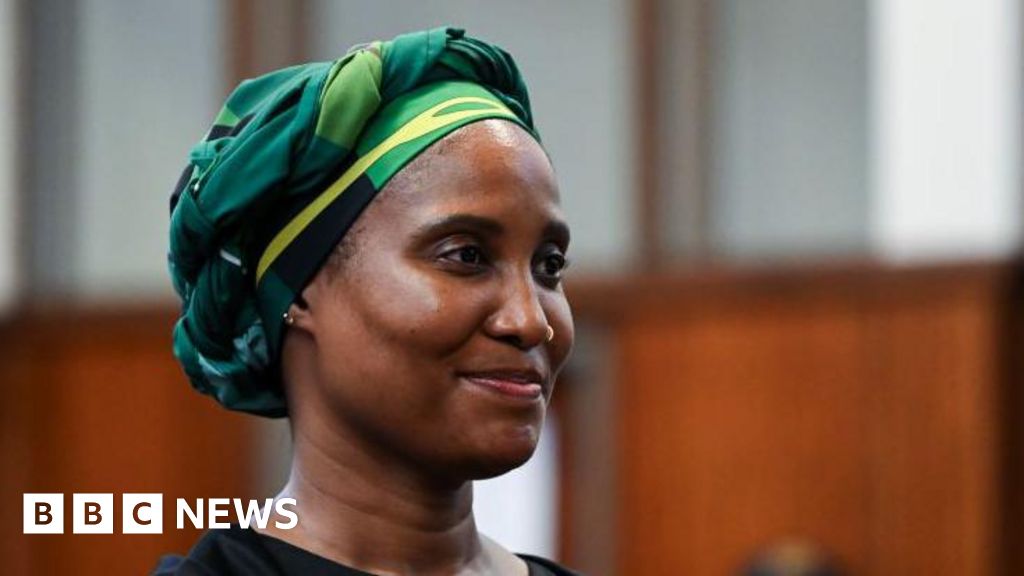Jacob Zuma's daughter denies terrorism charges as her trial starts

Duduzile Zuma-Sambudla Pleads Not Guilty to Terrorism-Related Charges in South Africa
DURBAN, South Africa - Duduzile Zuma-Sambudla, the daughter of former South African President Jacob Zuma, has pleaded not guilty to charges of incitement to commit terrorism and public violence. The trial began in the High Court in Durban on Monday, four years after widespread unrest gripped parts of the country following her father's imprisonment.
Charges Stem from 2021 Unrest
The charges against Zuma-Sambudla, 43, relate to comments she allegedly made on social media during the July 2021 riots. These riots, which resulted in the deaths of over 300 people and caused an estimated $2.8 billion in damages, were triggered by Jacob Zuma's arrest for contempt of court. He had refused to testify before a commission investigating corruption allegations during his presidency.
The unrest was largely concentrated in the Gauteng and KwaZulu-Natal provinces, marked by widespread looting, arson, and destruction of property. Prosecutors argue that Zuma-Sambudla's social media activity fueled the violence and incited further unrest.
Defense Claims Political Motivation
Zuma-Sambudla has consistently denied the charges, asserting that they are politically motivated. Her legal team has previously described the state's case as weak and suggested that the prosecution is an attempt to undermine her father, particularly after he formed the uMkhonto weSizwe (MK) party, which has challenged the ruling African National Congress (ANC).
A small group of supporters from the MK party, including Jacob Zuma himself and other party leaders, were present at the court to show their support. Zuma-Sambudla maintains that she is being targeted due to her father's political activities and her outspoken criticism of the ANC.
Context: The 2021 Riots and South Africa's Political Landscape
The 2021 riots exposed deep-seated socio-economic inequalities and political tensions within South Africa. Jacob Zuma's arrest ignited simmering discontent among his supporters, many of whom believe he is a victim of a political witch-hunt. The unrest also highlighted the fragility of the country's social fabric and the challenges of addressing poverty, unemployment, and inequality.
“The 2021 riots were a culmination of various factors, including economic hardship exacerbated by the COVID-19 pandemic, political grievances, and a sense of marginalization among certain segments of the population,” explains Dr. Sithembile Mbete, a senior lecturer in the Department of Political Sciences at the University of Pretoria. “The Zuma-Sambudla case is significant because it raises questions about the role of social media in inciting violence and the extent to which individuals can be held accountable for their online activity in the context of political unrest.”
Expert Analysis: Freedom of Speech vs. Incitement
The case raises complex legal and ethical questions about the boundaries of free speech and the responsibility of individuals to avoid inciting violence. Some legal experts argue that Zuma-Sambudla's social media posts, while potentially inflammatory, may not meet the legal threshold for incitement. Others contend that her position as the daughter of a former president gave her statements added weight and influence, making her responsible for the consequences of her words.
Professor Pierre de Vos, a constitutional law expert at the University of Cape Town, notes, "The key legal question will be whether Zuma-Sambudla's statements directly incited violence or whether they were merely expressions of political opinion. The prosecution will need to prove a clear causal link between her words and the subsequent acts of violence and destruction."
The Road Ahead
The trial is expected to be lengthy and complex, with both the prosecution and defense teams likely to present extensive evidence and arguments. The outcome of the case could have significant implications for freedom of speech in South Africa and the accountability of individuals for their online conduct during periods of social unrest. It also underscores the ongoing political tensions surrounding Jacob Zuma and his legacy within the country.
The trial is taking place in the KwaZulu-Natal High Court in Durban. Duduzile Zuma-Sambudla faces charges of incitement to commit terrorism and public violence. The charges relate to comments she allegedly made during the July 2021 riots in South Africa. She has pleaded not guilty and claims the charges are politically motivated.
The BBC will continue to follow this developing story and provide updates as the trial progresses.
Originally sourced from: BBC News Africa
